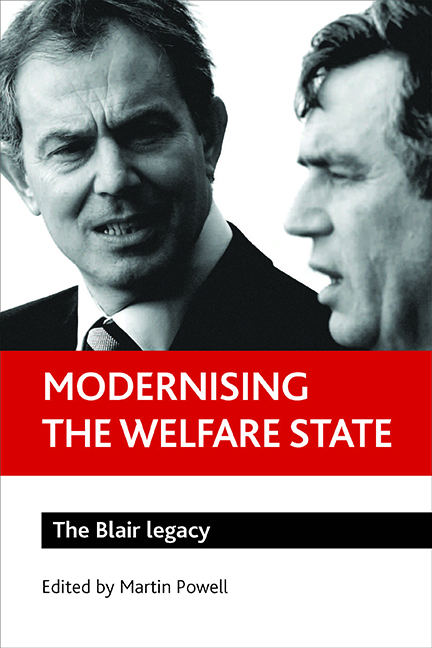Book contents
- Frontmatter
- Contents
- List of tables and figures
- Acknowledgements
- Notes on contributors
- one Introduction: modernising the welfare state
- two The NHS after 10 years of New Labour
- three Housing policy: coming in out of the cold?
- four Social security and welfare reform
- five Social care under Blair: are social care services more modern?
- six Education: from the comprehensive to the individual
- seven Controlling crime and disorder: the Labour legacy
- eight Social investment: the discourse and the dimensions of change
- nine Risk and the Blair legacy
- ten Going private?
- eleven Choice in public services: ‘no choice but to choose!’
- twelve The conditional welfare state
- thirteen The stages of New Labour
- fourteen Social Democratic reforms of the welfare state: Germany and the UK compared
- fifteen Conclusion: the Blair legacy
- Index
- Also available from The Policy Press
fifteen - Conclusion: the Blair legacy
Published online by Cambridge University Press: 21 January 2022
- Frontmatter
- Contents
- List of tables and figures
- Acknowledgements
- Notes on contributors
- one Introduction: modernising the welfare state
- two The NHS after 10 years of New Labour
- three Housing policy: coming in out of the cold?
- four Social security and welfare reform
- five Social care under Blair: are social care services more modern?
- six Education: from the comprehensive to the individual
- seven Controlling crime and disorder: the Labour legacy
- eight Social investment: the discourse and the dimensions of change
- nine Risk and the Blair legacy
- ten Going private?
- eleven Choice in public services: ‘no choice but to choose!’
- twelve The conditional welfare state
- thirteen The stages of New Labour
- fourteen Social Democratic reforms of the welfare state: Germany and the UK compared
- fifteen Conclusion: the Blair legacy
- Index
- Also available from The Policy Press
Summary
Introduction
There are a great number of terms used by supporters and critics to describe New Labour's social policy (Powell, 1999, 2002; Powell and Hewitt, 2002). They may not be relevant to all sectors, and may apply to different phases of the Labour governments, but they add up to a formidable list of claims:
• modern welfare state
• new welfare state
• Third Way
• new Social Democracy
• progressive agenda
• reformed public services
• world-class public services
• CORA (community, opportunity, responsibility, accountability)
• RIO (responsibility, inclusion, opportunity)
• social investment state
• positive welfare
• crossing the Rubicon (from universalism to means testing; from state
to private provision)
• hand up, not a handout
• investor's Britain
• no rights without responsibilities
• post-industrial welfare society
• new egalitarianism
• conditional welfare state
• changing behaviour – encouraging desirable behaviour and discouraging undesirable behaviour
• joined-up government
• preventive government
• outcome-focused government
• ending the ‘something for nothing’ society
• asset-based welfare
• Anglicanised communitarianism
• progressive universalism (provides ‘support for all and more help for those who need it most when they need it most’)
• welfare with the lid on
• active welfare
• active, enabling system
• active modern service
• ACTIVE: Active services; Customer-focused services; Transformed services; Integrity and security against fraud; Valuing staff; Efficient services
• we want to rebuild the system around work and security. Work for those who can; security for those who cannot
• welfare 2020 will be built on three core values of work, security and opportunity
• to put the consumer first
As we have seen, many of these terms and phrases have some resonance regarding the modernisation of the welfare state. This chapter revisits the analytical framework of Chapter One of modernisation and orders of change in order to summarise the material presented. It first examines views of the Blair legacy, summarises the evidence of the type and extent of change in the welfare state, places this material in a wider context and concludes by considering whether we have a new political consensus of ‘Camerownism’ (Cameron/Brown).
The Blair legacy
There have been a number of analyses of the Blair legacy during and after his period as Prime Minister. Rawnsley (2001) concludes that, compared with many governments, New Labour has a well aboveaverage record. However, by the measure of the expectations aroused by the size of the majority, New Labour's transformatory rhetoric and the ambitions that Blair had trumpeted, the government looks less impressive.
- Type
- Chapter
- Information
- Modernising the Welfare StateThe Blair Legacy, pp. 255 - 274Publisher: Bristol University PressPrint publication year: 2008



